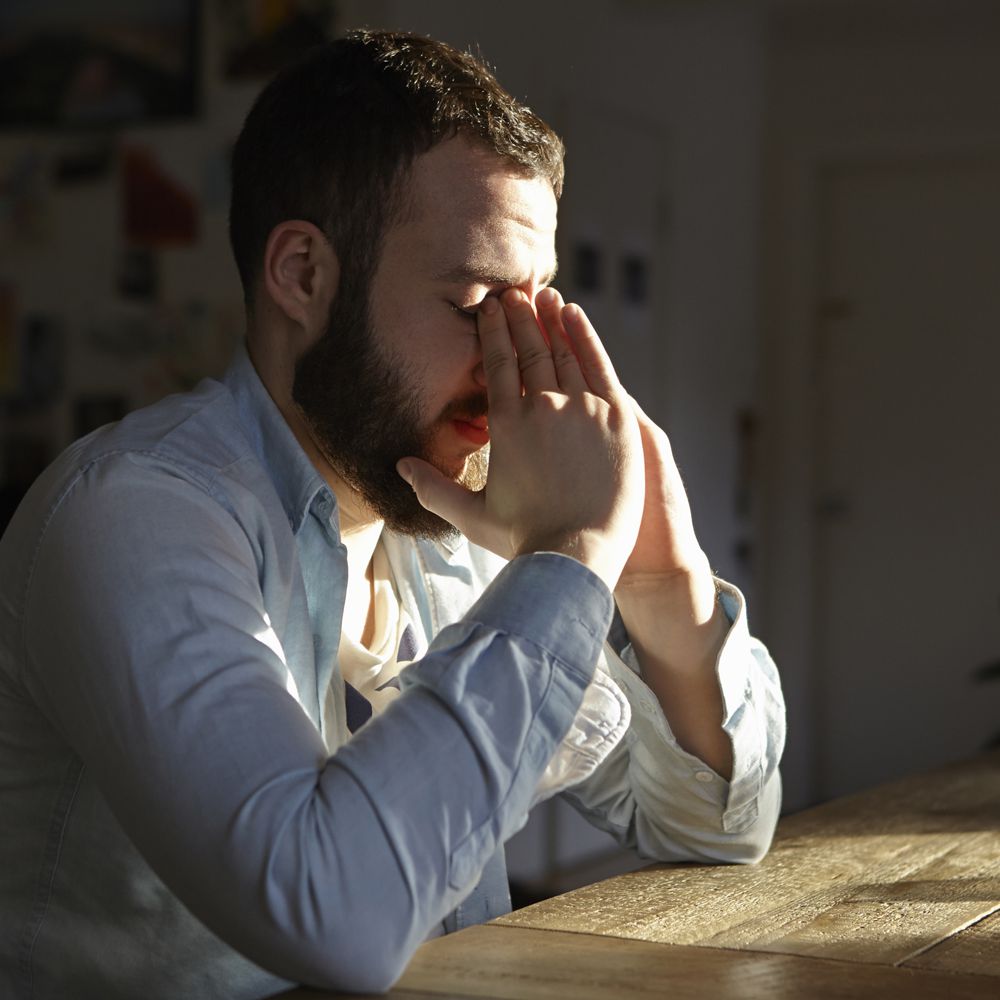Derealization anxiety is a condition that can cause feelings of detachment from the world around you. It can make the world seem like it’s not really there, or like it’s not real. This can be a very frightening experience, and it’s important to understand what this condition is and how to deal with it. In this blog post, we will discuss derealization anxiety in detail and provide some tips for coping with it.
Contents
What Is Derealization Anxiety?
 Derealization anxiety is a feeling of disconnection from the world around you. It can cause you to feel like you’re in a dream or that things around you are not real. This can be a very frightening experience, especially if it happens suddenly. It is often described as feeling like you are watching yourself from outside of your body.
Derealization anxiety is a feeling of disconnection from the world around you. It can cause you to feel like you’re in a dream or that things around you are not real. This can be a very frightening experience, especially if it happens suddenly. It is often described as feeling like you are watching yourself from outside of your body.
Derealization anxiety is often caused by stress or trauma. It can also be a symptom of certain mental health conditions, such as anxiety disorders, depression, and post-traumatic stress disorder (PTSD). According to studies, derealization is also a symptom of migraines, sleep deprivation, and certain types of medications.
If you’re experiencing derealization anxiety, it’s important to seek professional help. Derealization can be a very frightening experience, but there are treatments that can help. So you should never hesitate to reach out for help if you’re feeling overwhelmed.
What Are The Symptoms?
There are a few key symptoms that are associated with derealization anxiety. One of the most common is feeling disconnected from your surroundings. This can feel like you’re in a dream or watching yourself from outside your body. You may also have trouble focusing or paying attention, and things may seem hazy or unreal.
Other symptoms can include:
- Feeling like you’re in a movie or TV show
- Feeling detached from your emotions
- Trouble understanding or processing information
- Feeling like you’re not really yourself
- Changes in your sense of time, space, and/or body image
These symptoms can be extremely confusing and frightening. If you’re experiencing some of them, it’s important to reach out for help. It is believed that derealization can manifest itself as a symptom of another mental health condition, such as anxiety, depression, or PTSD. Therefore, treatment will likely focus on addressing the underlying condition.
If you think you may be experiencing derealization, talking to a mental health professional can help you get to the bottom of what’s going on and develop a plan for managing your symptoms.
Can Anxiety Cause Feelings Of Unreality?
 Derealization is a feeling of disconnection from reality. It can feel like you’re observing the world around you from outside your body. You may also feel like things around you are not real, or that they’re distorted in some way. Derealization can be a symptom of anxiety or other mental health conditions.
Derealization is a feeling of disconnection from reality. It can feel like you’re observing the world around you from outside your body. You may also feel like things around you are not real, or that they’re distorted in some way. Derealization can be a symptom of anxiety or other mental health conditions.
There is a connection between anxiety and derealization. For some people, anxiety can cause feelings of unreality or disconnection from reality. This may be due to the fact that anxiety can cause you to focus more on your thoughts. Anxiety can also make it difficult to process information, which can lead to feeling disconnected from what’s happening around you.
Anxiety actually causes changes in the way you perceive reality. For instance, when you’re anxious, you may be more likely to focus on your emotions and feelings less on your surroundings. This can lead to feeling like reality is not really there or that it’s distorted.
Derealization can be a very frightening experience. Because it’s so closely linked to anxiety, it can be difficult to manage. If you’re struggling with derealization, there are things you can do to help.
What Triggers Derealization Anxiety?
While the exact cause of derealization anxiety is unknown, it is often triggered by a traumatic event or prolonged stress. Because this type of anxiety can be so debilitating, it is important to understand what may trigger it and how to get help.
Other potential triggers include:
- Certain medications: It is possible that certain medications may trigger derealization anxiety. If you are taking any medication and begin to experience symptoms of anxiety, it is important to talk to your doctor.
- Sleep deprivation: Not getting enough sleep can also lead to derealization anxiety. This is because when we are tired, our bodies are more vulnerable to stress.
- Fatigue: This is similar to sleep deprivation, but can also be caused by physical or mental exhaustion.
- Substance abuse: Using drugs or alcohol can also lead to derealization anxiety. This is because these substances can alter our perception of reality and make it difficult to process information correctly.
- Illness: Some illnesses, such as migraines, can also trigger derealization anxiety. This is because the changes in our bodies can cause us to feel disconnected from reality.
If you are experiencing any of these symptoms, it is important to talk to a doctor or mental health professional. They will be able to help you understand what is causing your anxiety and how to best treat it. With understanding and treatment, you can begin to feel better and live a more normal life.
What Are The Consequences?
 Derealization anxiety can have a number of consequences. Some of the common impacts are listed below:
Derealization anxiety can have a number of consequences. Some of the common impacts are listed below:
- Derealization anxiety can make it difficult to concentrate or focus on anything.
- It can also cause problems with memory and recall.
- Derealization anxiety may lead to feelings of detachment from reality.
- People who suffer from derealization anxiety may also experience other symptoms such as dizziness, headaches, and nausea.
- Derealization anxiety can be extremely debilitating and may prevent sufferers from functioning normally in day-to-day life.
The consequences can be wide-ranging and vary from person to person. If you think you may be suffering from derealization anxiety, it is important to seek professional help. A qualified mental health professional will be able to assess your symptoms and provide you with the necessary treatment.
If left untreated, derealization anxiety can have a significant impact on your quality of life. If you are experiencing any of the symptoms listed above, please seek help from a qualified mental health professional.
How Do I Stop Derealization Anxiety?
If you’re experiencing derealization anxiety, there are a few things you can do to stop it. Let’s discuss a few of them.
Stay calm and relaxed
This is one of the first and most important things to do when you’re feeling anxious. It might be difficult to do, but try your best to stay calm and relaxed. Because if you’re feeling anxious, your body is going to be tense and this will only make the anxiety worse.
Talk to someone
It can be really helpful to talk to someone who understands what you’re going through. This could be a friend, family member, therapist, or anyone else who can offer support. Talking about your anxiety can help you to feel more in control of it.
Find a distraction
In derealization anxiety, it may be difficult to focus on anything other than your current anxiety. To help ease your symptoms, try to find a distraction. This can be anything that takes your mind off of your current worry and allows you to relax. For example, you may want to read a book, listen to music, or take a walk outdoors.
Breathe
If you’re feeling anxious, one of the first things you can do is take a deep breath. Inhale slowly and deeply through your nose, letting your stomach expand. Then exhale slowly through your mouth. Repeat this several times until you feel more relaxed. And gradually you will see that your anxiety eases up.
Avoid stimulants
It is best to avoid stimulants such as caffeine, nicotine, and energy drinks when you are feeling derealization anxiety. These substances can make your symptoms worse and make it difficult to focus. For example, if you are feeling anxious about a presentation, drinking coffee may make it harder to concentrate on your material.
Get enough sleep
Derealization anxiety can be caused by sleep deprivation or poor sleep quality. Make sure you are getting enough rest each night to prevent derealization anxiety. Because lack of sleep can also cause other health problems, it’s important to get seven to eight hours of sleep each night.
Challenge your thoughts
 This is something you can do on your own, without outside help. Simply become aware of the thoughts running through your head, and challenge them. Are they really true? Do they make sense? Are there other ways to look at the situation? When you challenge your thoughts, they lose their power over you.
This is something you can do on your own, without outside help. Simply become aware of the thoughts running through your head, and challenge them. Are they really true? Do they make sense? Are there other ways to look at the situation? When you challenge your thoughts, they lose their power over you.
Take a step back
When you’re feeling overwhelmed by anxiety, it can be helpful to take a step back and remind yourself of what’s real. Derealization is a feeling of disconnection from your surroundings, and it’s common for people with anxiety disorders. It can make you feel like you’re in a dream or that the world around you isn’t real.
Eat healthily
Eating a nutritious diet helps to keep your body and mind healthy. Avoid processed foods, sugary drinks, and excessive amounts of caffeine. Eat plenty of fruits, vegetables, whole grains, and lean protein. What you eat is always important, but it’s especially important when you’re dealing with derealization anxiety.
Exercise regularly
Regular exercise is a great way to reduce stress and improve your overall health. It can also help to reduce the symptoms of derealization anxiety. A moderate amount of exercise is the key. You don’t want to overdo it and make yourself more anxious. There are several different types of exercise that can be helpful in reducing anxiety.
Some people find that cardio is the best type of exercise for reducing anxiety. This includes activities like running, biking, and swimming. These activities can help to increase your heart rate and get your blood flowing.
See a therapist
 If you’re experiencing derealization, it’s important to see a therapist. Derealization can be a symptom of an underlying mental health condition, such as anxiety or depression. A therapist can help you identify and treat the underlying condition. Some common therapies that can help you might include:
If you’re experiencing derealization, it’s important to see a therapist. Derealization can be a symptom of an underlying mental health condition, such as anxiety or depression. A therapist can help you identify and treat the underlying condition. Some common therapies that can help you might include:
- Cognitive behavioral therapy (CBT)
- Dialectical behavior therapy (DBT)
- Acceptance and commitment therapy (ACT)
So there are several resources and therapies available to people who suffer from derealization. If you think you might be experiencing derealization, please reach out for help.
Find a balance that works for you and stick with it. If you’re not sure where to start, talk to your doctor or a certified personal trainer. They can help you create a safe and effective workout plan.
Conclusion
To conclude, derealization anxiety is a condition that can be debilitating and make it hard to function in day-to-day life. However, with the right treatment and support, it is possible to manage the symptoms and live a fulfilling life. If you think you may be suffering from derealization anxiety, please reach out to a mental health professional for help.
If you are struggling with anxiety or derealization, we urge you to reach out to one of our mental health professionals at Therapy Mantra. They will be more than happy to assist you on your journey to recovery. Contact us today to learn more about our services. You can also book an online therapy session or download our free Android or iOS app.


